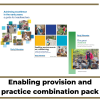DfE launches school-based nursery pilot
The Department for Education (DfE) has today launched a “test and learn” pilot for its planned expansion of school-based nursery provision. Under the scheme, primary
DfE has today launched a consultation on the new funding rates which will apply for 2-year-olds and under 2s when the new entitlements are introduced in England in 2024-25. The consultation sets out the government’s plans which are in brief:
Like the current funding formulae, under these new formulae the allocations to local authorities will be based on a base rate which will determine 89.5% of the rate plus an additional needs factor of 10.5%, multiplied by an Area Cost Adjustment reflecting local wages and premises costs. The additional needs factor will differ from the current formulae by including a mix of FSM and IDACI data with the stated aim of providing of better ensuring that the measures reflect areas with pockets of deprivation.
The existing funding formula for 3- and 4-year-olds is out of scope of the current consultation, as is the maintained nursery school supplementary funding. However, there is an open question at the end of the consultation response questionnaire.
The timetable for the introduction of the new entitlements is that parents will be able to access additional childcare for 38 weeks per year as follows:
We welcome the recognition that the staff: child ratios for younger children give rise to increased costs, and that these new entitlements need to be funded to a higher level than those for older children. We welcome the extension of EYPP and DAF to the younger age groups, and the inclusion of a disadvantage supplement in the formula. However, we are concerned that
Read our draft response to the consultation below. We welcome comments from members on the consultation, as well as urging members to respond directly.

The Department for Education (DfE) has today launched a “test and learn” pilot for its planned expansion of school-based nursery provision. Under the scheme, primary
Ofsted has today published its response to the “Big Listen” consultation. For the early years, it undertakes to: On the differences between early years and
We welcome the Department for Education’s announcement that the government are moving ahead with their manifesto commitment to scrap single-word Ofsted judgements for schools, effective immediately,
The National Audit Office’s new report, Improving educational outcomes for disadvantaged children, finds that in 2023-24, DfE allocated an estimated £9.2 billion to specifically focus
The letter below sets out our key asks for the next government.
On 10 June, Labour announced their plans for “over three thousand new nursery classes across England to open up access to childcare hours for families”,
The Conservative Manifesto has promised to extend Family Hubs to all local authorities. This would both extend funding for the 75 local authorities where they
The Lib Dems have published their manifesto, including commitments to incorporate the UN Convention on the Rights of the Child into UK law and to
Today, Friday 17 May, the Early Education and Childcare Coalition (EECC) has launched its new manifesto, with proposals to rescue and reform England’s early education
A report published by the National Audit Office (NAO) today finds that the timetable for the roll-out of the new funded early education and childcare
In response to recent queries about why the latest DfE guidance on providing the early education and childcare entitlements has removed references to additional charges
A new campaign to boost recruitment to the early years sector in England is being launched today by the government. The government press release says:
DfE have issued an update to address the issue of parents wishing to claim their codes for the new entitlements who cannot do so because
The Department for Education has today published its response to the EYFS consultation conducted in the summer. The changes will be implemented from January 2024
The Department for Education has today announced that the extra £204m for early years announced in the budget will be allocated to local authorities as
In a speech today, Kier Starmer will set out Labour’s plans to expand opportunity via five “missions” including “Early years reform – to boost child development with an
The Department for Education (DfE) is currently consulting on proposals to amend the Early Years Foundation Stage. They propose relaxing the requirements around the minimum
DfE has issued slightly more detail about the planned uplift in the hourly rates for the current and new entitlements, following the announcements in the
In today’s budget the Chancellor has confirmed several new measures on early education and childcare: Our analysis The decision to relax the ratios for 2-year-olds
Today, Early Education, the NAHT, NEU and Unison have jointly written an open letter calling on the government to address the shortfall in early years
Today, teachers from the National Education Union are striking, including many working in nursery and reception classes. In the last week, the Department for Education
We welcome the news that our President, Professor Cathy Nutbrown, has been made a Dame in the year’s New Years Honours list. This is much
The government’s latest changes to the early years funding formulae bring two key changes which we pointed out in our response to the consultation would
DfE have today announced the early years funding settlement for 2023-24, which leaves the early years sector struggling on below inflationary increases. While an additional
Ofsted’s latest annual review highlights the impact of recruitment and retention challenges and finds a link between inspection outcomes and the proportion of graduates in
In his Autumn Statement today the Chancellor failed to offer any financial help to an early years sector which is already struggling to stay afloat.
The tenth early years minister in ten years, Kelly Tolhurst, is now in post. It’s good news that early years is part of a Minister
We urge members to respond to the two DfE consultations on funding and ratios which close on 16 September. For information, you can view the
Comparing figures from January 2022 and January 2020, progress is being made towards previous levels of take up of funded early education. Latest figures from
Early Education welcomes the news that the new National Plan for Music Education has been extended to cover the early years. We are glad to
The Times Education Commission has today published a report which calls for “A significant boost to early years funding targeted at the most vulnerable and
Cathy Nutbrown, President of Early Education The twelve sessions of the May Annual National Conference 2022 left me reflecting on a strong thread which I
Ofsted has today launched a new five-year strategy. Elements of this which affect the early years include commitments to “simplify the regulatory regime for childminders”
We welcome the government’s new Sustainability and climate change strategy for education and children’s services, and that early years is reflected through a range of
A survey of maintained nursery schools carried out by Early Education in June 2021 has found increasing demand from children with SEND in the current
The DfE have issued documents to support schools and settings to understand how to report to the Early Years Census in the context of the









Early Education
2 Victoria Square
St Albans
AL1 3TF
T: 01727 884925
E: office@early-education.org.uk